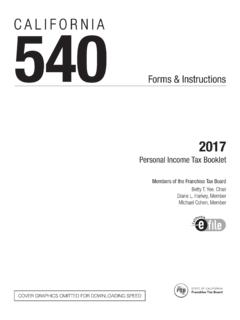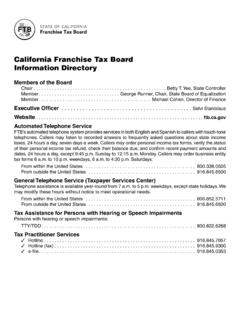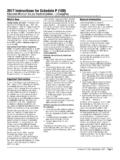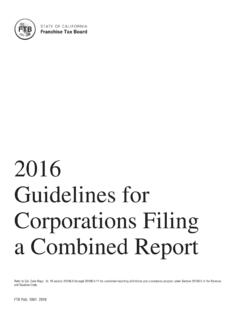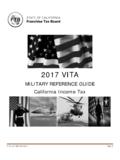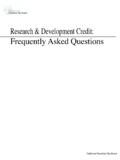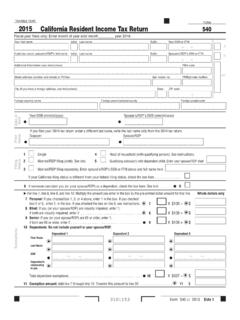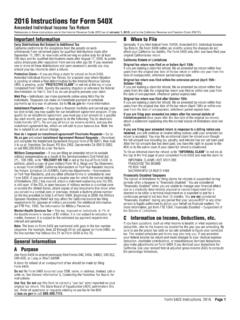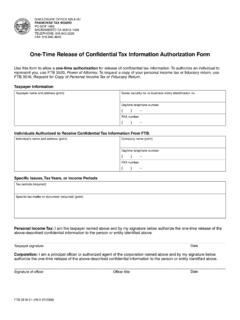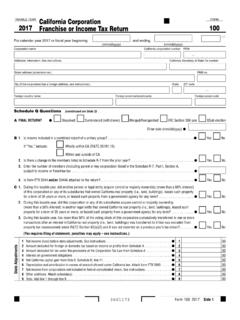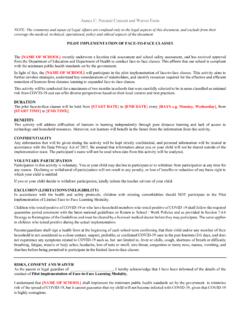Transcription of One-time Abatement of Timeliness Penalties
1 Bill Analysis Author: Bradford Sponsor: Franchise Tax Board Bill Number: SB 1374. Analyst: Davi Milam Phone: (916) 845-2551 Amended: March 25, 2020. Attorney: Shane Hofeling Related Bills: See Legislative History SUBJECT. One-time Abatement of Timeliness Penalties SUMMARY. This bill, under the Rev enue and Taxation Code (R&TC), w ould establish penalty Abatement authority similar to the federal first-time Abatement procedure, except that it w ould apply to indiv iduals subject to the Personal I ncome Tax Law (PI TL) only and w ould be a One-time Abatement .
2 RECOMMENDATION. Support. On December 10, 2018, the three-member Franchise Tax Board v oted in fav or of sponsoring this language. SUMMARY OF AMENDMENTS. The March 25, 2020, amendments remov ed prov isions of the bill related to the Streets and Highw ays Code, and replaced them w ith the prov isions discussed in this analysis. This is the department's first analysis of the bill. REASON FOR THE BILL. The reason for this bill is to authorize the Franchise Tax Board (FTB) to grant penalty relief that is similar to the I nternal Rev enue Service (I RS) practice of granting administrativ e relief to compliant taxpayers that could reduce taxpayer dissatisfaction and result in increased filing compliance.
3 ANALYSIS. This bill, under the R&TC, w ould establish penalty Abatement authority similar to the federal first-time Abatement procedure, except that it w ould apply to indiv iduals subject to the PI TL only and w ould be a One-time Abatement . Bill Analysis Bill Number: SB 1374. Amended March 25, 2020. This bill w ould require the FTB, upon taxpayer request, either orally or in w riting, to abate a failure-to-file or failure-to-pay penalty w hen: Reasonable cause is either absent or the taxpayer chooses to forgo a reasonable cause rev iew, and at the time the Abatement request is made.
4 The taxpayer is otherw ise compliant w ith their income tax filing requirements;. The taxpayer has not prev iously been granted Abatement under this new section; and The taxpayer has paid, or is current on an arrangement to pay, any tax, Penalties , fees, and interest currently due. This bill w ould define Timeliness penalty to mean a penalty imposed under Sections 19131 (failure-to-file) or 19132 (failure-to-pay) for one taxable year w ith respect to a return filed by an indiv idual for that taxable year.
5 (Please see State Law below for additional detail on these Penalties ). This bill also w ould prov ide the follow ing: A Timeliness penalty imposed and subsequently abated due to a determination of reasonable cause, or reasonable cause and not w illful neglect, w ith respect to the taxpayer or the taxpayer's spouse, w ould not affect eligibility for the Timeliness penalty Abatement this bill w ould allow . A Timeliness penalty w ould be considered imposed on the original due date of the return for the taxable year for w hich the penalty w as imposed.
6 This bill w ould exempt from the Administrativ e Procedures Act any rule, guideline, or procedure prescribed by the FTB pursuant to the section that w ould be added by this bill. Effective/Operative Date Assuming enactment by September 30, 2020, this bill w ould be effectiv e January 1, 2021, and specifically operativ e for requests for Abatement w ith respect to Penalties incurred for taxable years beginning on or after January 1, 2021. Federal/State Law Federal Law Current federal law imposes Penalties for failing to timely file a tax return or to timely pay tax.
7 The relev ant Penalties that apply to indiv iduals are: Page 2. Bill Analysis Bill Number: SB 1374. Amended March 25, 2020. Failure-to-File penalty The penalty for failure to file an income tax return by the due date is 5 percent of the amount of tax required to be show n on the return, less any earlier payments or credits, for the first month the return is late. The penalty increases by 5 percent, to a maximum of 25 percent, for each additional month the return remains unfiled. The penalty is calculated as the lesser of $100 or the amount of tax required to be show n on the return for failing to file w ithin 60 days of the due date, including extensions.
8 Failure-to-Pay penalty The penalty for failing to pay the tax show n on an income tax return or an assessed deficiency by the due date is generally one-half percent of the tax due for the first month the payment is late, increasing by one-half percent per month that the balance remains outstanding to a maximum of 25 percent. First-Time Abatement penalty Relief Beginning in 2001, taxpayers requesting Abatement of the failure-to-file and the failure- to-pay Penalties may be granted relief under the I RS administrativ e practice of abating these Penalties for taxpayers w ith a history of compliance.
9 First-time Abatement penalty relief is av ailable under the I RS's general authority, rather than being allow ed by statute or regulation. I n the I RS's modified first-time Abatement policy, dated April 5, 2013, a reasonable cause explanation prov ided by the taxpayer w ill be considered after considering the first-time Abatement analysis. I f the analysis show s that the taxpayer is not eligible for penalty relief under first-time Abatement , then the taxpayer's explanation w ill be used to determine if reasonable cause penalty relief criteria is met.
10 For a taxpayer that is giv en relief under the first-time Abatement , correspondence sent to the taxpayer states: We are pleased to inform you that your request to remove the (use applicable penalty , failure to file, failure to pay, or failure to deposit) penalty (s) has been granted. However, this action has been taken based solely on your compliance history rather than on the information you provided. This type of penalty removal is a One-time consideration available for a first-time penalty charge. IRS.
